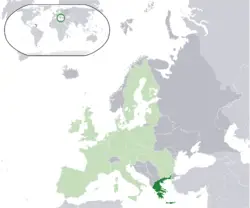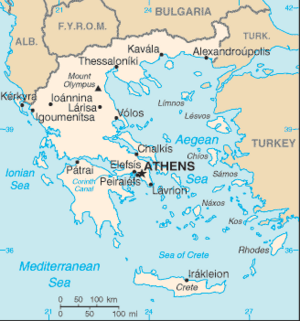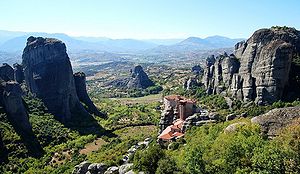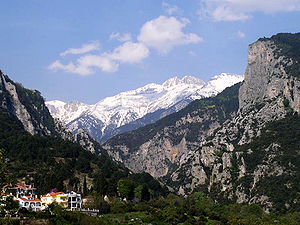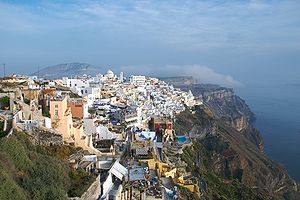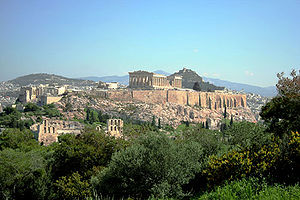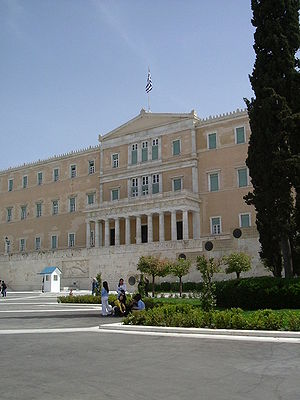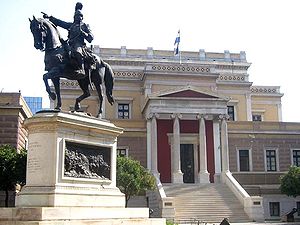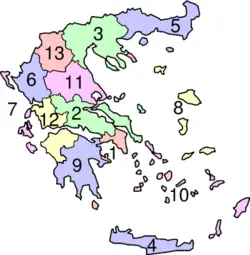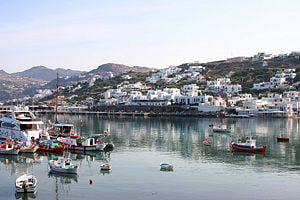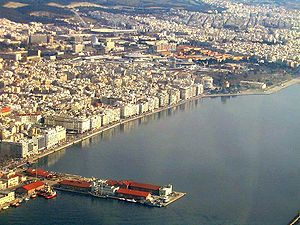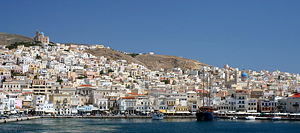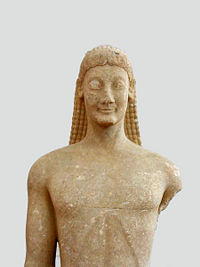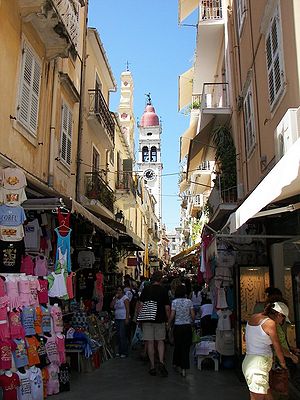Difference between revisions of "Greece" - New World Encyclopedia
Mike Butler (talk | contribs) |
Mike Butler (talk | contribs) |
||
| Line 221: | Line 221: | ||
===Ethnicity=== | ===Ethnicity=== | ||
| − | The only minority in Greece which receives special treatment is the [[Muslim minority of Greece|Muslim minority]] (Μουσουλμανική μειονότητα) in Thrace, which amounts to approximately 0.95 | + | [[Image:Thebeskouros.jpg|thumb|left|200px|Kouros of the Archaic period, Thebes Archaeological Museum.]] |
| + | [[Greek]]s make up 93 percent of the population, while other foreign citizens make up seven percent, according to the 2001 census. The percentage figures represent citizenship, since Greece does not collect data on ethnicity. | ||
| + | |||
| + | The Greeks are a nation and [[ethnic group]] who have populated [[Greece]] and the area of the [[Aegean Sea]] for over 3500 years. The [[Mycenaean Greece|Mycenaean]] proto-Greeks were probably the first historical people to arrive in the area now referred to as 'Greece' (the southern tip of the Balkan peninsula) in the [[16th century B.C.E.]] and the first that can be considered 'Greek' as an ethnic identity. The Greek [[genetical]] Tree was constructed revealed homogeneity between Europeans. Median networks revealed that most of the Greek haplotypes are clustered to the five known [[haplogroups]] and that a number of [[haplotypes]] are shared among Greeks and other European and Near Eastern populations. | ||
| + | |||
| + | The only minority in Greece which receives special treatment is the [[Muslim minority of Greece|Muslim minority]] (Μουσουλμανική μειονότητα) in Thrace, which amounts to approximately 0.95 percent of the total population. Its members are predominantly of [[Turkish people|Turkish]], [[Pomaks|Pomak]] and [[Romani people|Roma]] ethnic origins. Other recognized ethnic minorities include approximately 35,000 [[Armenians]] and 5500 [[Jews]]. | ||
===Religion=== | ===Religion=== | ||
| Line 403: | Line 408: | ||
{{Black Sea Economic Cooperation countries}} | {{Black Sea Economic Cooperation countries}} | ||
{{La Francophonie|state=collapsed}} | {{La Francophonie|state=collapsed}} | ||
| − | {{credit|Greece|172790248|Geography_of_Greece|172344135|Politics_of_Greece|172908009}} | + | {{credit|Greece|172790248|Geography_of_Greece|172344135|Politics_of_Greece|172908009|Demographics_of_Greece|173339426|Greeks|173583533}} |
Revision as of 03:24, 25 November 2007
| Ελληνική Δημοκρατία Ellīnikī́ Dīmokratía Hellenic Republic |
||||||
|---|---|---|---|---|---|---|
|
||||||
| Motto: Ελευθερία ή θάνατος Eleftheria i thanatos (transliteration) "Freedom or Death" |
||||||
| Anthem: Ύμνος εις την Ελευθερίαν (Ímnos is tin Eleftherían) Hymn to Freedom |
||||||
| Location of Greece (dark green) – on the European continent (light green dark grey) – in the European Union (light green) |
||||||
| Capital (and largest city) | Athens 38°00′N 23°43′E | |||||
| Official languages | Greek | |||||
| Demonym | Greek | |||||
| Government | Parliamentary republic | |||||
| - | President | Karolos Papoulias | ||||
| - | Prime Minister | Kostas Karamanlis | ||||
| - | President of Parliament | Dimitrios Sioufas | ||||
| Modern statehood | ||||||
| - | Independence from the Ottoman Empire |
25 March 1821 |
||||
| - | Recognized | 30 November 1829, at the London Conference | ||||
| - | Current constitution | 1975, "Third Republic" | ||||
| EU accession | January 1 1981 | |||||
| Area | ||||||
| - | Total | 131,990 km² (96th) 50,944 sq mi |
||||
| - | Water (%) | 0.8669 | ||||
| Population | ||||||
| - | 2007 estimate | 11,170,957 [1] (74th) | ||||
| - | 2001 census | 10,964,020 [2] | ||||
| - | Density | 84/km² (88th) 218/sq mi |
||||
| GDP (PPP) | 2007 IMF estimate | |||||
| - | Total | $391.395 billion (30th) | ||||
| - | Per capita | $35,167 (18th) | ||||
| GDP (nominal) | 2007 IMF estimate | |||||
| - | Total | $356.258 billion (27th) | ||||
| - | Per capita | $32,010 (25th) | ||||
| Gini (2000) | 35.42 (low) | |||||
| Currency | Euro (€)1 (EUR) |
|||||
| Time zone | EET (UTC+2) | |||||
| - | Summer (DST) | EEST (UTC+3) | ||||
| Internet TLD | .gr3 | |||||
| Calling code | +30 | |||||
| 1 | Prior to 2001: Greek Drachma. | |||||
| 2 | UNU/Wider World Income Inequality Database. | |||||
| 3 | The .eu domain is also used, as it is shared with other European Union member states. | |||||
Greece (Greek: Ελλάδα [eˈlaða] or Ελλάς [eˈlas]), officially the Hellenic Republic (Greek: Ελληνική Δημοκρατία [eliniˈkʲi ðimokraˈtia]), is a country in Southeastern Europe, situated on the southern end of the Balkan Peninsula.
Greece lies at the juncture of Europe, Asia, and Africa. It is heir to the heritages of classical Greece, the Byzantine Empire, and nearly four centuries of Ottoman rule. Regarded as the cradle of western civilization and the birthplace of democracy, the Olympic Games, western literature, political science, major scientific principles and drama including both tragedy and comedy, Greece has a particularly long and eventful history and a cultural heritage considerably influential in Northern Africa and the Middle East, and fundamentally formative for the culture of Europe and what may be called the West.
Modern Greece is a developed country, a member of the European Union since 1981, a member of the Economic and Monetary Union of the European Union since 2001, NATO since 1952, the OECD since 1961, the WEU since 1995, and ESA since 2005.Athens is the capital; Thessaloniki, Patras, Heraklion, Volos and Larissa are some of the country's other major cities.
Geography
Greece borders Albania, the former Yugoslav Republic of Macedonia and Bulgaria to the north, and Turkey to the east. The Aegean Sea lies to the east and south of mainland Greece, while the Ionian Sea lies to the west. Both parts of the Eastern Mediterranean basin feature a vast number of islands.
With a land area of 50,944 square miles (131,990 square kilometers), Greece is slightly smaller than the state of Alabama in the United States.
Greece consists of a mountainous and craggy mainland jutting out into the sea at the southern end of the Balkans, the Peloponnesus peninsula (separated from the mainland by the canal of the Isthmus of Corinth), and numerous islands (around 2,000), including Crete, Euboea, Lesbos, Chios, the Dodecanese and the Cycladic groups of the Aegean Sea as well as the Ionian Sea islands.
Four-fifths of Greece consist of mountains or hills, making the country one of the most mountainous in Europe. Western Greece contains a number of lakes and wetlands and it is dominated by the Pindus mountain range. Pindus has a maximum elevation of 8648 feet) (2636 meters) and it is essentially a prolongation of the Dinaric Alps.
The range continues through the western Peloponnese, crosses the islands of Kythera and Antikythera and find its way into southwestern Aegean, in the island of Crete where it eventually ends. (the islands of the Aegean are peaks of underwater mountains that once constituted an extension of the mainland). Pindus is characterized by its high, steep peaks, often dissected by numerous canyons and a variety of other karstic landscapes. Most notably, the impressive Meteora formation consisting of high, steep boulders provides a breathtaking experience for the hundreds of thousands of tourists who visit the area each year. Special lifts transfer visitors to the scenic monasteries that lie on top of those rocks.
Mount Olympus is the highest mountain in the country, located in the southwestern Pieria prefecture, near Thessaloniki. Mytikas in the Olympus range has a height of 9573 feet (2918 meters) at its highest peak. Once considered the throne of the Gods, it is today extremely popular among hikers and climbers who deem its height as a challenge.
Expansive plains are primarily located in the prefectures of Thessaly, Central Macedonia and Thrace. They constitute key economic regions as they are among the few arable places in the country. Volos and Larissa are the two largest cities of Thessaly.
Greece's climate is divided into three classes:
- A Mediterranean climate features mild, wet winters and hot, dry summers. Temperatures rarely reach extremes, although snowfalls do occur occasionally even in Athens, Cyclades or Crete during the winter.
- An alpine climate is found primarily in Western Greece (Epirus, Central Greece, Thessaly, Western Macedonia as well as central parts of the Peloponnese like Achaea, Arkadia and parts of Lakonia where the Alpine range pass by).
- A temperate climate is found in Central and Eastern Macedonia as well as in Thrace at places like Komotini, Xanthi and northern Evros; with cold, damp winters and hot, dry summers.
The southern suburbs of Athens are in the Mediterranean zone, while northern suburbs have a temperate climate. The average January (winter) temperature in Athens is 50°F (10°C). July (summer) sea-level temperature approaches 80°F (27°C), although heat waves can push the temperature up over 100°F (38°C).
Most rivers in Greece are short, unsuitable for navigation, and of limited use for irrigation. The main rivers are the Vardar, Struma, and Néstos, which cross Greek Macedonia and Thrace to enter the northern Aegean. Also in the northeast are the east-flowing Aliákmon and Piniós (Peneus), and in the Peloponnese, is the Evrótas.
Fifty percent of Greece is covered by forests with a rich varied vegetation which spans from Alpine coniferous to the Mediterranean type vegetation. Seals, sea turtles and other rare marine life live in the seas around Greece, while Greece's forests provide home to brown bears and lynx and to wolves, roe deer, wild goat, foxes and boars, amongst others.
Natural resources include lignite, petroleum, iron ore, bauxite, lead, zinc, nickel, magnesite, marble, salt, and hydropower potential.
Severe earthquakes are the main natural hazard, while air and water pollution are the main environmental issues. Air pollution remains to some degree an issue for Athens, particularly on the hottest summer days. Nevertheless, widespread measures taken by the authorities throughout the 1990s have dramatically improved air quality.
Athens is the capital and largest city in Greece, and as one of the world's oldest cities, its recorded history spans at least 3000 years. Today the Greek capital, Europe's 8th largest conurbation, is rapidly becoming a leading business centre in the European Union. A bustling and cosmopolitan metropolis with an urban population of 3.3 million and total population of about 3.8 million, Athens is central to economic, financial, industrial, political and cultural life in Greece.
History
The shores of Greece's Aegean Sea saw the emergence of the first advanced civilizations in Europe. Minoan and Mycenean civilizations, and later Greek city-states, emerged across the Greek peninsula but also on the shores of Black Sea, South Italy and Asia Minor, reaching great levels of prosperity that resulted in an unprecedented cultural boom, expressed in architecture, tragedy, drama, science and philosophy, and nurtured in Athens under a democratic environment. Athens and Sparta led the way in repelling the Persian Empire in a series of battles. Both were later overshadowed by Thebes and eventually Macedonia, with the latter under the guidance of Alexander the Great uniting and leading the Greek world to victory over the Persians, to presage the Hellenistic era, itself brought only partially to a close two centuries later with the establishment of Roman rule over Greek lands in 146 B.C.E.
The subsequent mixture of Roman and Hellenic culture took form in the establishment of the Eastern Roman Empire in 330 C.E. around Constantinople , to remain a major cultural and military force for the next 1,123 years until the its fall at the hands of Ottomans in 1453. On the eve of the Ottoman era the Greek intelligentsia migrated to Western Europe, playing a significant role in the Western European Renaissance through the transferring of works by Ancient Greeks to Western Europe. Nevertheless, the Ottoman millet system contributed to the ethnic cohesion of Orthodox Greeks by segregating the various peoples within the Ottoman Empire based on religion as the latter played an an integral role in the formation of modern Greek identity.
Through the Greek War of Independence, successfully fought against the Ottoman Empire from 1821 to 1829, the Greek nascent state was finally recognized under the London Protocol. In 1827, Ioannis Kapodistrias, a noble Greek from the Ionian Islands, was chosen as the first governor of the new Republic. However, following his assassination, the Great Powers soon installed a monarchy under Otto, of the Bavarian House of Wittelsbach. In 1843, an uprising forced the King to grant a constitution and a representative assembly. Due to his unimpaired authoritarian rule, he was eventually dethroned in 1863 and replaced by Prince Vilhelm (William) of Denmark, who took the name George I and brought with him the Ionian Islands as a coronation gift from Britain. In 1877, Charilaos Trikoupis, a dominant figure of the Greek political scene who is attributed with the significant improvement of the country's infrastructure, curbed the power of the monarchy to interfere in the assembly by issuing the rule of vote of confidence to any potential prime minister.
Following the Balkan Wars of 1912-13, Greece successfully doubled in territory and population, a challenging context both socially and economically. In the years after, the struggle between the new king King Constantine I and his charismatic prime minister Eleftherios Venizelos, over the country's foreign policy on the eve of WW I, dominated the country's political order, and divided the country into two bitterly hostile factions (see National Schism).
In the aftermath of WW I, Greece fought a bloody and eventually unsuccessful war against Turkish nationalists led by Mustafa Kemal Atatürk (Greco-Turkish War (1919-1922), which resulted in a massive population exchange between the two countries under the Treaty of Lausanne. Instability and successive coup d'etats marked the following era, which was also coloured by the massive task of incorporating the 1.5 million refugees from the Asia Minor into Greek society. On 28 October 1940 Fascist Italy demanded the surrender of Greece, but the greek administration famously provided the brief response of response of "OXI" ("No"). In the following Greco-Italian War, Greece repelled Italian forces into Albania, giving the Allies their first victory over Axis forces on land. The country would eventually fall to urgently dispatched German forces during the Battle of Greece, but occupiers nevertheless met serious challenges from the Greek Resistance.
After liberation, Greece experienced a bitter civil war between Royalist and Communist forces, which led to economic devastation and severe social tensions between its Rightists and recently outlawed Leftists. The next 20 years were characterized by a significant economic growth, propelled in part by the Marshall Plan. In 1965, a period of political turbulence and the rise of the center-left led to a coup d’etat on April 21, 1967 by the Regime of the Colonels. On November 1973 the Athens Polytechnic Uprising sent shock waves across the regime, and a counter-coup established Brigadier Dimitrios Ioannides as dictator. On July 20, 1974, as Turkey invaded the island of Cyprus, using a junta-sponsored coup d'etat in the island as a pretext, the regime collapsed.
Ex-Premier Constantine Karamanlis was invited back from Paris where he had lived in self-exile since 1963, marking the beginning of the Metapolitefsi era ; a 1975 democratic republican constitution was activated and the monarchy abolished by a referendum held that same year. On January 1 1981 Greece entered the European Union, and has experienced an unprecedented period of prosperity ever since. Meanwhile , Andreas Papandreou had also founded the Panhellenic Socialist Party, or PASOK, in response to Constantine Karamanlis New Democracy party, and the two groupings have dominated Greek political affairs in the ensuing decades. Under Kostas Simitis's stewardship Greece completed its move to the Euro zone in 2001 and the country successfully organized the 2004 Olympic Games in Athens.
Government and politics
The 1975 constitution, which describes Greece as a "presidential parliamentary republic," includes extensive specific guarantees of civil liberties and vests the powers of the head of state in a president elected by parliament. The Greek governmental structure is similar to that found in many Western democracies, and has been described as a compromise between the French and German models. The prime minister and cabinet play the central role in the political process, while the president performs some executive and legislative functions in addition to ceremonial duties.
The head of state is the President of the Republic, who is elected by the Parliament for a five-year term, and is eligible for a second term. The president appoints the leader of the party securing plurality of vote in a legislative election to become prime minister and form a government.
The president appoints leader of the party securing most votes in a legislative election to become prime minister and form a government. The Prime Minister exercises vast political power, and the amendment of 1986 further strengthened his position to the detriment of the President of the Republic. The Cabinet of Greece includes the heads of all executive ministries, appointed by the president on the recommendation of the prime minister.
The Greek Parliament (Vouli ton Ellinon) has 300 members, elected for a four-year term by a system of reinforced proportional representation in 48 multi-seat constituencies, eight single-seat constituencies and a single nationwide list. A total 288 of the 300 seats are determined by constituecy voting, and voters may select the candidate or candidates of their choice by marking their name on the party ballot. The remaining 12 seats are filled from nationwide party lists on a top-down basis and based on the proportion of the total vote each party received. Any single party must receive at least a three percent nationwide vote tally to gain representation. Suffrage is universal and compulsory to those aged 18 years and over.
The Judiciary is independent of the executive and the legislature and comprises three Supreme Courts: the Court of Cassation (Άρειος Πάγος), the Council of State (Συμβούλιο της Επικρατείας) and the Court of Auditors (Ελεγκτικό Συνέδριο). The Judiciary system is also composed of civil courts, which judge civil and penal cases and administrative courts, which judge administrative cases, namely disputes between the citizens and the State.
Since the restoration of democracy the party system is dominated by the liberal-conservative New Democracy and the socialist Panhellenic Socialist Movement (PASOK). Non-negligible parties include the Communist Party of Greece, the Coalition of the Radical Left and the Popular Orthodox Rally.
On March 7, 2004, Kostas Karamanlis, president of the New Democracy party and nephew of the late Constantine Karamanlis was elected as the new Prime Minister of Greece, thus marking his party's first electoral victory in nearly eleven years. Karamanlis took over government from Kostas Simitis of PASOK, who had been in office since January 1996, replacing the ailing Andreas Papandreou who died on June 23, 1996. Kostas Karamanlis won a second term on September 16, 2007, however his party acquired a slimmer majority in the Greek Parliament gaining only 152 out of 300 seats.
Administrative divisions
Greece is divided in 13 peripheries, further divided into 51 prefectures, the "Nomoi". The prefectures are each headed by a prefect (the "Nomarch"), who is elected by direct popular vote. The 13 regional administrative districts (peripheries), each including a number of prefectures are headed by a regional governor (the "Peripheriarch"), appointed by the Minister of the Interior. In northern Greece and in greater Athens, three areas have an additional administrative position between the nomarch and peripheriarch. This official, known as the Chair of the prefectural local authorities or "superprefect" (the "Hypernomarch"), is elected by direct popular vote together with the nomarchs she or he supervises. Although municipalities and villages have elected officials, they do not have an adequate independent revenue base and must depend on the central government budget for a large part of their financial needs. Consequently they are subject to numerous central government controls. This also leads to extremely low municipal taxes (usually around 0.2 percent or less). The 13 peripheries are: Attica 1, Central Greece 2, Central Macedonia 3, Crete 4, East Macedonia and Thrace 5, Epirus 6, Ionian Islands 7, North Aegean 8, Peloponnese 9, South Aegean 10, Thessaly 11, West Greece 12, and West Macedonia 13.
Greece also includes one autonomous region, the Monastic Community of the Holy Mountain, Mount Athos.
The Hellenic Armed Forces consists of army, air force and navy. The army had 109,266 personnel on active duty in 2007, and the air force had 33,000 active troops. Greece has an extensive navy, with Hydra class and more Standard class frigates.Greece was the first Mediterranean country to receive guided missile destroyers, which have since been decommissioned. Military service is compulsory for males in the year they turn 18 — with a service obligation of 12 months for the army and air force, and 15 months for the navy. About 4.3 percent of GDP was spent on defence in 2005.
Economy
Greece operates a capitalist economy that produced a GDP of $305.595-billion in 2006. Its principal economic activities include tourism and shipping industries, banking and finance, manufacturing and construction and telecommunications. The country serves as the regional business hub for many of the world's largest multinational companies.
The people of Greece enjoy a high standard of living. Greece ranks 24th in the 2006 HDI, 22nd on The Economist's 2005 world-wide quality-of-life index, and it has an average per capita income that has been estimated at $35,167 for the year 2006, comparable to that of Germany, France and Italy and approximately 116 percent of the EU average. Unemployment rate was 9.2 percent in 2006.
Greece's present prosperity is largely owed to the post-World War II "Greek economic miracle" (when GDP growth averaged 7 percent between 1950 and 1973), the implementation of a number of structural and fiscal reforms, combined with considerable European Union funding over the last 25 years and increasing private consumption. The latter facts have contributed to a consistent annual growth of the Greek GDP that was surpassing the respective one of most other EU partners.
Today, the service industry (74.4 percent) makes up the largest, most vital and fastest-growing sector of the Greek economy, followed by industry (20.6 percent) and agriculture (5.1 percent). The tourism industry is a major source of foreign exchange earnings and revenue accounting for 15 percent of Greece’s total GDP and employing (directly or indirectly) 659,719 people (or 16.5 percent of total employment). In 2005, Greece welcomed almost 18 million visitors and in 2006 that figure almost reached 20 million.
The Greek banking and finance sector is also an important source of revenue and employment and Greek banks have invested heavily in the Balkan region. The manufacturing sector accounts for about 13 percent of GDP with the food industry leading in growth, profit and export potential.
High-technology equipment production, especially for telecommunications, is also a fast-growing sector. Other important areas include textiles, building materials, machinery, transport equipment, and electrical appliances. Construction (10 percent of GDP) and agriculture (7 percent) are yet two other significant sectors of the Greek economic activity.
Maritime Industry
The shipping industry is a key element of Greek economic activity. Given that Greece is a peninsula, shipping in ancient times was the natural way for Greeks to reach their neighboring people, trade with them and expand by establishing colonies. Today, shipping is one of the country's most important industries. It accounts for 4.5 percent of GDP, employs about 160,000 people (4 percent of the workforce), and represents 1/3 of the country's trade deficit.
During the 1960s, the size of the Greek fleet nearly doubled, primarily through the investment undertaken by the shipping magnates Onassis and Niarchos. The basis of the modern Greek maritime industry was formed after World War II when Greek shipping businessmen were able to amass surplus ships sold to them by the United States Government through the Ship Sales Act of the 1940s. According to the BTS, the Greek-owned maritime fleet is today the largest in the world, with 3079 vessels accounting for 18 percent of the world's fleet capacity (making it the largest of any other country) with a total dwt of 141,931 thousand (142 million dwt). In terms of ship categories, Greece ranks first in both tankers and dry bulk carriers, fourth in the number of containers, and fourth in other ships. However, today's fleet roster is smaller than an all-time high of 5,000 ships in the late 70s.
Science and Technology
Because of its strategic location, qualified workforce and political and economic stability, many multinational companies, such as Ericsson, Siemens, SAP, Motorola, Coca-Cola have their regional R&D Headquarters in Greece.
In 2003, public spending on research and development was 456,37 million Euros (12.6 percent increase from 2002). Total research and development spending (both public and private) as a percentage of GDP has increased considerably since the beginning of the past decade, from 0.38 percent in 1989, to 0.65 percent in 2001. Research and development spending in Greece remains lower than the EU average of 1.93 percent.
In 2001, there were 55,626 researchers (from 30,500 in 1993)in such fields as telecommunications, microelectronics, multimedia, computer science, computer networks and software engineering, attracting the interest of many multinational companies and producing an increasing number of high quality publications. Of that number, approximately 33,507 were employed in Higher Education Foundations, 13,100 by private companies, 8,800 in State-owned Research Centres and approximately 200 in non-profit private research centres.
Greece's technology parks with incubator facilities include the Science and Technology Park of Crete (Heraklion), the Thessaloniki Technology Park, the Lavrio Technology Park, and the Patras Science Park.
Greece has been a member of the European Space Agency (ESA) since 2005. Cooperation between ESA and the Hellenic National Space Committee began in the early 1990s. In 1994, Greece and ESA signed their first cooperation agreement. Having formally applied for full membership in 2003, Greece became ESA's sixteenth member on March 16 2005. As member of the ESA, Greece participates in the agency's telecommunication and technology activities, and the Global Monitoring for Environment and Security Initiative.
Exports totalled $20.28-billion in 2006. Export commodities included food and beverages, manufactured goods, petroleum products, chemicals, and textiles. Export partners included Germany 11.5 percent, Italy 11.4 percent, Bulgaria 6.5 percent, UK 6.1 percent, Cyprus 5.5 percent, Turkey 5.2 percent, France 4.5 percent, US 4.5 percent, Spain 4.1 percent. Imports totalled $64.59-billion in 2006. Import commodities included machinery, transport equipment, fuels, and chemicals. Import partners included Germany 12.6 percent, Italy 11.5 percent, Russia 7.1 percent, France 5.9 percent, Netherlands 5.2 percent, and South Korea 4.2 percent.
Demographics
Population
The official Statistical body of Greece is the National Statistical Service of Greece (NSSG). According to the NSSG, Greece's total population in 2005 was 11,082,752, of whom 5,486,632 were males and 5,596,119 females. As statistics from 1971, 1981 and 2001 show, the Greek population has been aging the past several decades. The birth rate in 2003 stood 9.5 per 1,000 inhabitants (14.5 per 1,000 in 1981). At the same time the mortality rate increased slightly from 8.9 per 1,000 inhabitants in 1981 to 9.6 per 1,000 inhabitants in 2003. In 2001, 16.71% of the population were 65 years old and older, 68.12% between the ages of 15 and 64 years old, and 15.18% were 14 years old and younger. In 1971 the figures were 10.92%, 63.72% and 25.36% respectively. Almost two-thirds of the Greek people live in urban areas. Greece's largest cities in 2001 were: Athens (3,361,806), Thessaloniki (800,764), Patra (185,626), Iraklio (144,642), Volos (124,591), and Larissa (124,394).
Greeks had an average life expectancy at birth of 79.38 years (76.85 years for males; 82.06 years for females) in 2007.
Immigration
Due to the complexity of Greek immigration policy, practices and data collection, truly reliable data on immigrant populations in Greece is difficult to gather and therefore subject to much speculation. A study from the Mediterranean Migration Observatory maintains that the 2001 Census from the NSSG recorded 762,191 persons residing in Greece without Greek citizenship, constituting around 7% of total population and that, of these, 48,560 were EU or EFTA nationals and 17,426 Cypriots with privileged status. At the same time, Albanians constituted some 56% of total immigrants, followed by Bulgarians (5%), Georgians (3%) and Romanians (3%). Americans, Cypriots, British and Germans appeared as sizeable foreign communities at around 2% each of total foreign population. The rest were around 690,000 persons of non-EU or non-homogeneis status.
The greatest cluster of non-EU immigrant population is in the Municipality of Athens –some 132,000 immigrants, at 17% of local population. Thessaloniki is the second largest cluster, with 27,000 – but reaching only 7% of local population. After this, the predominant areas of location are the Athens environs.
According to the same study, the foreign population (documented and undocumented) residing in Greece may in reality figure upwards to 8.5% or 10.3%, that is approximately meaning 1.15 million - if immigrants with homogeneis cards are accounted for.
Ethnicity
Greeks make up 93 percent of the population, while other foreign citizens make up seven percent, according to the 2001 census. The percentage figures represent citizenship, since Greece does not collect data on ethnicity.
The Greeks are a nation and ethnic group who have populated Greece and the area of the Aegean Sea for over 3500 years. The Mycenaean proto-Greeks were probably the first historical people to arrive in the area now referred to as 'Greece' (the southern tip of the Balkan peninsula) in the 16th century B.C.E. and the first that can be considered 'Greek' as an ethnic identity. The Greek genetical Tree was constructed revealed homogeneity between Europeans. Median networks revealed that most of the Greek haplotypes are clustered to the five known haplogroups and that a number of haplotypes are shared among Greeks and other European and Near Eastern populations.
The only minority in Greece which receives special treatment is the Muslim minority (Μουσουλμανική μειονότητα) in Thrace, which amounts to approximately 0.95 percent of the total population. Its members are predominantly of Turkish, Pomak and Roma ethnic origins. Other recognized ethnic minorities include approximately 35,000 Armenians and 5500 Jews.
Religion
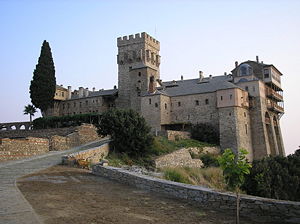
The constitution of Greece recognizes the Greek Orthodox faith as the "prevailing" religion of the country, while guaranteeing freedom of religious belief for all.[1] The majority of Greek citizens (97%) identify themselves as Greek Orthodox,[2] and most of them celebrate at least the main religious feasts, especially Pascha (Greek Orthodox Easter).
The Greek Government does not keep statistics on religious groups and censuses do not ask for religious affiliation.[2] Judaism has existed in present-day Greece for more than 2000 years. Sephardic Jews had made such a large presence in the city of Thessaloniki that their traditional language, Ladino, had been spoken by the non-Jews of the city as well. Few Greek Jews survived the Holocaust, and today the Jewish community as estimated to be around 5,000. Estimates of the recognised Muslim minority, which is mostly located in Thrace, range from 98,000 to 140,000,[2][3] (between 0.9% and 1.2%) while the immigrant Muslim community numbers between 200,000 and 300,000.[2] In an address to the Holy Synod of the Orthodox Church of Greece on 10 October 2006 Archbishop Christodoulos stated: "Today more than 500,000 Muslims live in our country."[4]
Greek members of Roman Catholic faith (including both Byzantine Greek Catholics and Latin Catholics) are estimated at 50,000 [2][3] with the Roman Catholic immigrant community approximating 200,000.[2] Old Calendarists account for 500,000 followers.[3] The Jehovah's Witnesses report having 30,000 active members.[2][3] Protestants including Evangelicals stand at about 30,000.[3][2] Free Apostolic Church of Pentecost and other Pentecostals denominations are about 12,000.[5] Mormons can also be found with 420 followers,[2] and Scientologists with 500 followers.[2] The long-standing Jewish community numbers approximately 5,500 followers.[2][3]
Ancient Greek religion has also reappeared,[6] with approximately 2,000 adherents, comprising 0.02% of the general population.[7] Some of these Greek religionists have made claims that they are not reconstructionists but are just people coming out of the closet.[8]
In the Eurostat - Eurobarometer poll of 2005, 81% of Greek citizens responded that they believe there is a God,[9] whereas 16% answered that they believe there is some sort of spirit or life force,[9] and 3% that they do not believe there is a God, spirit, nor life force.[9] Greece's percentage of respondents asserting that they believe there is a God was the third highest among EU members behind Malta and Cyprus.[9]
Language
Men and women
Rural men and women traditionally shared agricultural tasks, and land and property have long been owned by both men and women. Among those who worked outside the home, women occupied lower-paid positions and stopped working when they had children, altough by the late twentieth century, women constituted 45 percent of the workforce. Traditionally, men took on public roles and women private, although women in attend, cleaned, and maintained churches. Women maintained a key economic role in the family, as well as being mother, wife, and daughter, maintained the household, and became involved in dancing, music, and crafts. Women received full voting rights in 1956, and the Family Law of 1983 established legal gender equality in family relationships and decision making. A total 53 percent of students in universities are women, and the percentage of women in public office has increased.
Marriage and the family
The family is the basic unit of support and identity, and nearly all people marry. Arranged marriages were common but have declined. Marriages are monogamous, and the average age at marriage is the late 20s for women and the mid-30s for men. Marriage rates kept falling from almost 71 per 1000 inhabitants in 1981 until 2002, only to increase slightly in 2003 to 61 per 1000. The divorce rate is among the lowest in Europe, although it has increased from 89.2 per 1000 marriages in 1981 to 191 per 1000 marriages in 2002. Until 1982, all marriages occurred in churches, but civil marriages have been legal since that time. Nuclear family households are the most common, various forms of extended kin arrangements also exist. It is common for elderly parents to join the household of one of their adult children. Regarding inheritance, sons and daughters receive roughly equivalent shares of their parents' wealth. Daughters customarily received their portion at marriage, but the Family Law of 1983 made the practice of dowry illegal, although some property transfer at marriage continues.
Education
Compulsory education in Greece comprises primary schools (Δημοτικό Σχολείο, Dimotikó Scholeio) and gymnasium (Γυμνάσιο). Nursery schools (Παιδικός σταθμός, Paidikós Stathmós) and kindergartens (Νηπιαγωγείο, Nipiagogeío) are popular but not compulsory. Children start primary school aged 6 and remain there for six years. Some primary schools are "all-day", offering an extended timetable and enriched syllabus. Attendance at gymnasia starts at age 12 and last for three years. Greece's post-compulsory secondary education consists of two school types: unified upper secondary schools (Ενιαίο Λύκειο, Eniaia Lykeia) and technical-vocational educational schools (Τεχνικά και Επαγγελματικά Εκπαιδευτήρια, "TEE"). Post-compulsory secondary education also includes vocational training institutes (Ινστιτούτα Επαγγελματικής Κατάρτισης, "IEK") which provide a formal but unclassified level of education. As they can accept both Gymnasio (lower secondary school) and Lykeio (upper secondary school) graduates, these institutes are not classified as offering a particular level of education.
Public higher education is divided into universities, "Highest Educational Institutions" (Ανώτατα Εκπαιδευτικά Ιδρύματα, Anótata Ekpaideytiká Idrýmata, "ΑΕΙ") and "Highest Technological Educational Institutions" (Ανώτατα Τεχνολογικά Εκπαιδευτικά Ιδρύματα, Anótata Technologiká Ekpaideytiká Idrýmata, "ATEI"). Students are admitted to these Institutes according to their performance at national level examinations taking place after completion of the third grade of Lykeio. Additionally, students over twenty-two years old may be admitted to the Hellenic Open University through a form of lottery.
The Greek education system also provides special kindergartens, primary and secondary schools for people with special needs or difficulties in learning. Specialist gymnasia and high schools offering musical, theological and physical education also exist.
Some of the main universities in Greece include:
National and Capodistrian University of Athens · National Technical University of Athens · University of Piraeus · University of Macedonia (in Thessaloniki) · University of Crete ·Technical University of Crete · Athens University of Economics and Business · Aristotle University of Thessaloniki · University of the Aegean (across the Aegean Islands) · Democritus University of Thrace · University of Ioannina · University of Thessaly · Panteion University of Social and Political Sciences · University of Patras · Charokopeio University of Athens · Ionian University (across the Ionian Islands)
Regarding literacy, 97.5 percent of the total population over the age of 15 could read and write in 2003.
Class
The modern Greek state, the departure of the Ottomans, and the dismantling of agricultural estates, has brought mobility to the class system. Social status results from a combination of wealth, education, occupation, and what is known as philotimo, or one's sense of social responsibility, esteem, and attention to proper behavior. The trappings of wealth convey a high position, as do urban residence, the use of katharevousa, fluent English and French, and the adoption of Western styles.
Culture
Greek culture evolved over several thousand years, with its earliest known civilization being in the Mycenean and Minoan era, continuing into Classical Greece, the birth of the Hellenistic era and through the influence of the Roman Empire and its Greek Eastern successor the Byzantine Empire. The Ottoman Empire also had a significant influence on Greek culture, but the Greek war of independence is credited for the revitalization Greece and establishing a single [once again] sovereign single entity (though notably smaller), of its multi-faceted culture throughout the ages.
Notably Greece is known as "the cradle of Western civilization".
Sports
The Greek national football team is the reigning UEFA European Champions having won the EURO 2004.[10] In the final, the team managed to beat their Portuguese opponents by 1-0.[10] They are as of March ranked 15th in the world,[11] and are currently first in their 2008 UEFA European Football Championship qualifying group. The Greek Super League is the highest professional football league in the country. Currently sixteen clubs compete in that league, playing each other twice, once at home and once away. At the end of each season, the bottom three clubs are relegated to the Second National League only to be replaced by the top three teams from that particular league. The top three most known football clubs are Panathinaikos, Olympiacos, and AEK Athens.
The men's Greek national basketball team actually is more successful with a decades-long tradition of excellence. Greece is generally considered an important power in international basketball and the national team is regarded as one of the best in the world. They have won the European Championship twice, once in 1987 and again in 2005,[12] and have reached the final four in three of the last four FIBA World Championships (1994, 1998, 2006) taking second place in 2006. They currently are ranked 5th in the world.[13] The domestic Greek basketball league, A1 Ethniki is composed of fourteen teams. The most successful Greek teams are Panathinaikos, Aris Salonica, Olympiacos, AEK Athens and PAOK.
Armed Forces
The Hellenic Armed Forces are overseen by the Hellenic National Defense General Staff (Γενικό Επιτελείο Εθνικής Άμυνας - ΓΕΕΘΑ) and consists of three branches:
- GES Greece.PNG
Hellenic Army
- Haf.PNG
Hellenic Air Force
- GEN Greece.PNG
Hellenic Navy
International Rankings
| Organization | Survey | Ranking |
|---|---|---|
| United Nations Development Programme | Human Development Index 2006[14] Human Development Index 2004[15] Human Development Index 2000[15] |
24 out of 177 24 out of 177 24 out of 177 |
| The Economist | Worldwide Quality-of-life Index, 2005[16] | 22 out of 111 |
| International Monetary Fund | GDP per capita (PPP)[17] | 27 out of 180 |
| Heritage Foundation/Wall Street Journal | Index of Economic Freedom[18] | 57 out of 157 |
| Reporters Without Borders | Worldwide Press Freedom Index 2006[19] Worldwide Press Freedom Index 2005[20] Worldwide Press Freedom Index 2004[21] |
32 out of 168 18(tied) out of 168 33 out of 167 |
| Transparency International | Corruption Perceptions Index 2006[22] Corruption Perceptions Index 2005[23] Corruption Perceptions Index 2004[24] |
54 out of 163 47 out of 158 49 out of 145 |
| World Economic Forum | Global Competitiveness Report[25] | 47 out of 125 |
| Yale University/Columbia University | Environmental Sustainability Index 2005[26] | 67 out of 146 |
| Nationmaster | Labor strikes[27] | 13 out of 27 |
| A.T. Kearney / Foreign Policy | Globalization Index 2006 [28] Globalization Index 2005 [29] Globalization Index 2004 [30] |
32 out of 62 29 out of 62 28 out of 62 |
See also
Template:Topics in Greece
Notes
- ↑ Cite error: Invalid
<ref>tag; no text was provided for refs namedcon1 - ↑ 2.00 2.01 2.02 2.03 2.04 2.05 2.06 2.07 2.08 2.09 2.10 International Religious Freedom Report 2006: Greece. US Dept. of State/Bureau of Democracy, Human Rights, and Labor. www.state.gov (2006-09-15). Retrieved 2007-04-14.
- ↑ 3.0 3.1 3.2 3.3 3.4 3.5 Executive Summary Discrimination on the grounds of religion and belief GREECE. Dr Ioannis Ktistakis & Dr Nicholas Sitaropoulos. ec.europa.eu (2004-06-22). Retrieved 2007-04-14.
- ↑ Εκκλησία, Official Gazette of the Church of Greece, October 2006, page 737
- ↑ Synod of Apostolic Church of Christ
- ↑ CNN, http://edition.cnn.com/2007/WORLD/europe/01/21/ancient.gods.ap/index.html
- ↑ US Department of State, http://www.state.gov/g/drl/rls/irf/2006/71383.htm
- ↑ http://www.superfectafilms.com/
- ↑ 9.0 9.1 9.2 9.3 Eurobarometer: Social values, science, and technology. Eurobarometer. europa.eu.int (2005-06). Retrieved 2007-04-14.
- ↑ 10.0 10.1 McNulty, Phil, "Greece win Euro 2004", BBC News, news.bbc.co.uk, 2004-07-04. Retrieved 2007-05-07.
- ↑ FIFA World Rankings. FIFA. www.fifa.com (April 2007). Retrieved 2007-05-07.
- ↑ Wilkinson, Simon, "Greece tops Germany for Euro Title", ESPN, sports.espn.go.com, 2005-09-26. Retrieved 2007-05-07.
- ↑ FIBA World Rankings. FIBA. www.fiba.com (2007). Retrieved 2007-05-07.
- ↑ Human Development Report 2006. United Nations Development Program. hdr.undp.org (2006). Retrieved 2007-04-10.
- ↑ 15.0 15.1 Greece: Human Development Index Trends. United Nations Development Program. hdr.undp.org. Retrieved 2007-04-28.
- ↑ Worldwide Quality of Life - 2005. The Economist. www.economist.com (2005). Retrieved 2007-04-10.
- ↑ Gross domestic product per capita, current prices. International Monetary Fund. Retrieved 2007-05-04.
- ↑ Index of Economic Freedom. Heritage Foundation & The WSJ. www.heritage.org (2007). Retrieved 2007-04-10.
- ↑ North Korea, Turkmenistan, Eritrea the worst violators of press freedom. Reporters Without Borders. www.rsf.org (2006). Retrieved 2007-04-10.
- ↑ North Korea, Eritrea and Turkmenistan are the world’s “black holes” for news. Reporters without Borders. www.ref.org (2005). Retrieved 2007-04-28.
- ↑ East Asia and Middle East have worst press freedom records. Reporters without Borders. www.ref.org (2004). Retrieved 2007-04-28.
- ↑ CPI Table. Transparency International. www.transparency.org (2006). Retrieved 2007-04-10.
- ↑ Transparency International's Annual Report 2005. Transparency International. www.transparency.org (2005). Retrieved 2007-04-28.
- ↑ Transparency International's Annual Report 2004 (2004). Retrieved 2006-04-28.
- ↑ Global Competitiveness Report 2006-2007. World Economic Forum. www.weforum.org (2006). Retrieved 2007-04-10.
- ↑ Environmental Sustainability Index. Yale and Columbia University. www.yale.edu (2005). Retrieved 2007-04-27.
- ↑ Labor Statistics: Strikes by Country. Nation Master. www.nationmaster.com. Retrieved 2007-04-27.
- ↑ A.T. Kearney/Foreign Policy Globalization Index 2006. A.T. Kearney/FOREIGN POLICY. www.atkearney.com (2006). Retrieved 2007-04-27.
- ↑ A.T. Kearney/Foreign Policy Magazine Globalization Index 2005. A.T. Kearney/FOREIGN POLICY. www.atkearney.com (2005). Retrieved 2007-04-27.
- ↑ A.T. Kearney/Foreign Policy Magazine Globalization Index 2004. A.T. Kearney/FOREIGN POLICY. www.atkearney.com (2004). Retrieved 2007-04-27.
ReferencesISBN links support NWE through referral fees
- Dagtoglou, P.D. (1991). "Protection of Individual Rights", Constitutional Law — Individual Rights — Volume I (in Greek). Athens-Komotini: Ant. N. Sakkoulas Publishers.
- Mavrias, Kostas G. (2002). Constitutional Law (in Greek). Athens: Ant. N. Sakkoulas Publishers. ISBN 9-60150-663-2.
- (2004) The Constitution of Greece. Athens: Hellenic Parliament. ISBN 9-605-60073-0. Retrieved 2007-09-20.
- Venizelos, Evangelos (2002). "The Contribution of the Revision of 2001", The "Acquis" of the Constitutional Revision (in Greek). Athens: Ant. N. Sakkoulas Publishers. ISBN 9-60150-617-9.
- Richard Clogg, A Concise History of Greece, Second Edition, Cambridge University Press 2002
- Minorities in Greece - historical issues and new perspectives. History and Culture of South Eastern Europe. An Annual Journal. München (Slavica) 2003.
- 2007 Greek forest fires
External links
- Greece World Fact Book 2007, accessed November 22, 2007.
- Culture of Greece Countries and Their Cultures Ge-It, accessed November 25, 2007.
- Greece Encyclopaedia Britannica Online, accessed November 22, 2007.
Government
- President of the Hellenic Republic (English)
- Prime Minister of the Hellenic Republic (English)
- Hellenic Parliament (English)
- Greek News Agenda Newsletter
- Greece — information and links related to Greece from the ministry of foreign affairs
- Greek missions abroad (embassies, consulates, representations)
- Foreign missions in Greece
- Greek National Tourism Organisation
- National Statistical Service of Greece
Other
- Encyclopaedia Britannica - Greece's country page
- Hellenic History
- The Greek Heritage
- Open Directory Project: Greece
- Chronology of Greece from the World History Database
- History of Greece: Primary Documents
- Greek Political Structure
- Historical Reconstruction of Greek Pankration
- Greek Council for Refugees
| Topics about Ancient Greece | |
|---|---|
| Places | Aegean Sea • Hellespont • Macedon • Sparta • Athens • Corinth • Thebes • Thermopylae • Antioch • Alexandria • Pergamon • Miletus • Delphi • Olympia • Troy |
| Life | Agriculture • Art • Cuisine • Economy • Law • Medicine • Paideia • Pederasty • Pottery • Prostitution • Slavery • Technology • Olympic Games |
| Philosophers | Pythagoras • Heraclitus • Parmenides • Protagoras • Empedocles • Democritus • Socrates • Plato • Aristotle • Zeno • Epicurus |
| Authors | Homer • Hesiod • Pindar • Sappho • Aeschylus • Sophocles •
Euripides • Aristophanes • Menander • Herodotus • Thucydides • Xenophon • Plutarch • Lucian • Polybius • Aesop |
| Buildings | Parthenon • Temple of Artemis • Acropolis • Ancient Agora • Arch of Hadrian • Temple of Zeus at Olympia • Colossus of Rhodes • Temple of Hephaestus • Samothrace temple complex |
| Chronology | Aegean civilization • Minoan Civilization • Mycenaean civilization • Greek dark ages • Classical Greece • Hellenistic Greece • Roman Greece |
| People of Note | Alexander The Great • Lycurgus • Pericles • Alcibiades • Demosthenes • Themistocles |
| Art and Sculpture | Kouroi • Korai • Kritios Boy • Doryphoros • Statue of Zeus • Discobolos • Aphrodite of Knidos • Laocoön • Phidias • Euphronios • Polykleitos • Myron |
| Geographic locale | |||||||||
|
Countries of Europe
Albania · Andorra · Armenia2 · Austria · Azerbaijan1 · Belarus · Belgium · Bosnia and Herzegovina · Bulgaria · Croatia · Cyprus2 · Czech Republic · Denmark3 · Estonia · Finland · France3 · Georgia1 · Germany · Greece · Hungary · Iceland · Ireland · Italy · Kazakhstan1 · Latvia · Liechtenstein · Lithuania · Luxembourg · Republic of Macedonia · Malta · Moldova · Monaco · Montenegro · Netherlands3 · Norway3 · Poland · Portugal · Romania · Russia1 · San Marino · Serbia · Slovakia · Slovenia · Spain3 · Sweden · Switzerland · Turkey1 · Ukraine · United Kingdom3 · Vatican City 1 Has majority of its territory in Asia. 2 Entirely in Asia but having socio-political connections with Europe. 3 Has dependencies or similar territories outside Europe.
| |||||||||
| Greece in the European Union |
{{Template group |title = International membership |list =
| North Atlantic Treaty Organisation (NATO) | |
|---|---|
| Belgium | Bulgaria | Canada | Czech Republic | Denmark | Estonia | France | Germany | Greece | Hungary | Iceland | Italy | Latvia | Lithuania | Luxembourg | The Netherlands | Norway | Poland | Portugal | Romania | Slovakia | Slovenia | Spain | Turkey | United Kingdom | United States of America | |
| Organisation for Economic Co-operation and Development (OECD) | OECD logo |
|---|---|
| Australia | Austria | Belgium | Canada | Czech Republic | Denmark | Finland | France | Germany | Greece | Hungary | Iceland | Ireland | Italy | Japan | South Korea | Luxembourg | Mexico | Netherlands | New Zealand | Norway | Poland | Portugal | Slovakia | Spain | Sweden | Switzerland | Turkey | United Kingdom | United States | |
Albania · Angola · Antigua and Barbuda · Argentina · Armenia · Australia · Austria · Bahrain · Bangladesh · Barbados · Belize · Benin · Bolivia · Botswana · Brazil · Brunei (Brunei Darussalam) · Burkina Faso · Burundi · Cambodia · Cameroon · Canada · Central African Republic · Chad · Chile · China (PRC) · Colombia · Democratic Republic of the Congo · Republic of the Congo · Costa Rica · Cote d'Ivoire · Croatia · Cuba · Djibouti · Dominica · Dominican Republic · Ecuador · Egypt · El Salvador · European Union¹ · Former Yugoslav Republic of Macedonia (FYROM) · Fiji · Gabon · The Gambia · Georgia · Ghana · Grenada · Guatemala · Guinea · Guinea-Bissau · Guyana · Haiti · Honduras · Hong Kong² · Iceland · India · Indonesia · Israel · Jamaica · Japan · Jordan · Kenya · South Korea · Kuwait · Kyrgyzstan · Lesotho · Liechtenstein · Macau² · Madagascar · Malawi · Malaysia · Maldives · Mali · Mauritania · Mauritius · Mexico · Moldova · Mongolia · Morocco · Mozambique · Myanmar · Namibia · Nepal · New Zealand · Nicaragua · Niger · Nigeria · Norway · Oman · Pakistan · Panama · Papua New Guinea · Paraguay · Peru · Philippines · Qatar · Rwanda · St. Kitts and Nevis · St. Lucia · St. Vincent and the Grenadines · Saudi Arabia · Senegal · Sierra Leone · Singapore · Solomon Islands · South Africa · Sri Lanka · Suriname · Swaziland · Switzerland · Separate Customs Territory of Taiwan, Penghu, Kinmen, and Matsu · Tanzania · Thailand · Togo · Trinidad and Tobago · Tunisia · Turkey · Uganda · United Arab Emirates · United States · Uruguay · Venezuela · Vietnam · Zambia · Zimbabwe
- All twenty-seven member states of the European Union are also members of the WTO in their own right: Austria • Belgium • Bulgaria • Cyprus • Czech Republic • Denmark • Estonia • Finland • France • Germany • Greece • Hungary • Ireland • Italy • Latvia • Lithuania • Luxembourg • Malta • Netherlands and Netherlands Antilles • Poland • Portugal • Romania • Slovakia • Slovenia • Spain • Sweden • United Kingdom.
- Special Administrative Region of the People's Republic of China.
Template:Black Sea Economic Cooperation countries
| Member states and observers of La Francophonie | |
|---|---|
| Members | Albania · Andorra · Belgium (French Community) · Benin · Bulgaria · Burkina Faso · Burundi · Cambodia · Cameroon · Canada (New Brunswick • Quebec) · Cape Verde · Central African Republic · Chad · Cyprus1 · Comoros · Democratic Republic of the Congo · Republic of the Congo · Côte d'Ivoire · Djibouti · Dominica · Egypt · Equatorial Guinea · Former Yugoslav Republic of Macedonia · France (including French Guiana • Guadeloupe • Martinique • St. Pierre and Miquelon) · Gabon · Ghana1 · Greece · Guinea · Guinea-Bissau · Haiti · Laos · Luxembourg · Lebanon · Madagascar · Mali · Mauritania · Mauritius · Moldova · Monaco · Morocco · Niger · Romania · Rwanda · St. Lucia · São Tomé and Príncipe · Senegal · Seychelles · Switzerland · Togo · Tunisia · Vanuatu · Vietnam |
| Observers | |
Credits
New World Encyclopedia writers and editors rewrote and completed the Wikipedia article in accordance with New World Encyclopedia standards. This article abides by terms of the Creative Commons CC-by-sa 3.0 License (CC-by-sa), which may be used and disseminated with proper attribution. Credit is due under the terms of this license that can reference both the New World Encyclopedia contributors and the selfless volunteer contributors of the Wikimedia Foundation. To cite this article click here for a list of acceptable citing formats.The history of earlier contributions by wikipedians is accessible to researchers here:
- Greece history
- Geography_of_Greece history
- Politics_of_Greece history
- Demographics_of_Greece history
- Greeks history
The history of this article since it was imported to New World Encyclopedia:
Note: Some restrictions may apply to use of individual images which are separately licensed.

